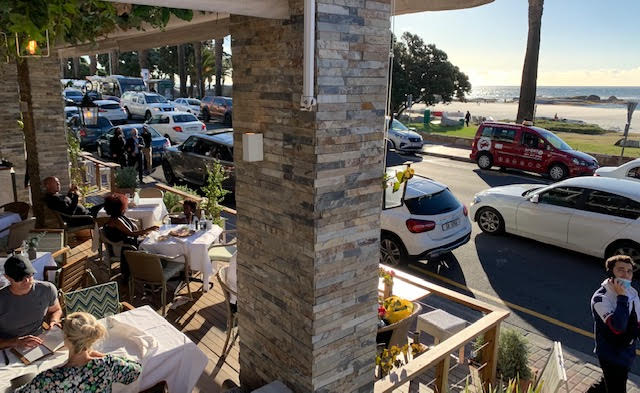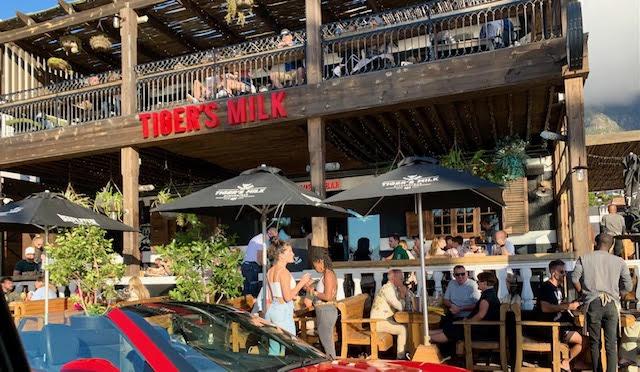Jubilant South Africa lifts curfew as Omicron wave subsides rapidly with minimal Covid hospital admissions and Delta killed off: ‘Expect the same in other countries’

Optimism is growing rapidly in South Africa as the wave of Covid infections caused by the Omicron variant seems to subside as quickly as it came.
Infections are down and multiple Covid experts have confirmed the Omicron wave is subsiding quickly.
The government therefore lifted the months-long curfew last night, allowing South Africans to party deep into the night this weekend.
Ridhwaan Suliman, a senior researcher at the South African Council for Scientific and Industrial Research (CSIR), said the country has “surpassed the peak of the Omicron wave now, driven by the significant decline in the populous province and epicentre: Gauteng,” the province that is home to Johannesburg, the country’s largest city.
Although test positivity remains “still high at 29.8 per cent,” the fact the figure is decreasing confirms “the decline in infections is real and not a testing artifact,” Suliman added.
Other Covid researchers are saying the same.
Michelle Groome, of the National Institute of Communicable Diseases (NICD), told reporters that “we have surpassed the peak of infections.”
Figures from the NCID showed that new cases dropped by 23 per cent over the past seven days, following a 14 per cent decrease a week earlier.
Moreover, the death figure is “substantially lower” than that experienced with the Delta variant, South African vaccinologist Shabir Mahdi told CNN.
Hospitalizations and deaths from this wave have proven to be “significantly lower relative to that experienced in previous waves,” Suliman agreed.
Suliman stressed that this wave as a “steeper but significantly shorter wave,” as it took “about half the number of days to reach the peak compared with previous waves in South Africa.”
It also seems the much more deadly Delta mutation has largely been replaced by Omicron, which – according to multiple studies – seems to be the mildest variant so far.
‘Other countries can expect same decline’
The Covid expert who has been leading the country’s pandemic response, Salim Abdool Karim – South Afrcia’s most important infectious-diseases scientist – said the peak of the Omicron wave has passed and he is convinced “every other country, or almost every other, will follow the same trajectory.”
“If previous variants caused waves shaped like Kilimanjaro, omicron’s is more like we were scaling the North Face of Everest,” Abdool Karim told The Washington Post, referring to the near-vertical increase in infections that South Africa recorded in the first weeks of December.

Also, the widely-respected and well-known chairwoman of the South African Medical Association, Dr. Angelique Coetzee, told CNN’s New Day program South Africa was “over the curve” and said numbers are “much lower.”
There are currently no restrictions in South Africa. Apart from a midnight-5am curfew, restaurants, shops, cinemas, bars and gyms are all open, both indoors as well as outdoors.
South Africa’s summer is currently in full swing, which means many people are taking time off, are travelling or are going out. The government said it has no intention to impose any new restrictions or additional rules.
This is in sharp contrast with a range of European nations, most notably the Netherlands and Austria, which have introduced fresh lockdowns or additional Covid restrictions as they face rapidly rising Covid infections due to the new Omicron variant.
In the UK, new measures have acome into force in Scotland, Wales and Northern Ireland but ministers have so far swerved dictating new rules to those in England, instead hoping warnings would encourage people to self-police their own behaviour and cut down on social contacts.
Compensation demands
Despite the upbeat numbers in South Africa, the country is calling for compensation from the UK for the economic damage his country suffered as a result of Britain placing SA on its ‘red travel list’ in November.
South Africa’s Department of International Relations is demanding compensation after the movement of people was severely restricted, saying Africa’s largest economy took a serious beating because of Britain’s decision.
Ministry spokesperson Clayson Monyele told various media in South Africa that the travel ban had caused severe economic damage and Britain should pay for that.
“Are you going to compensate us, because it has now been proven that the travel curb was wrong.”
SA Ministry spokesperson Clayson Monyele
He stressed many people have had to cancel their Christmas plans due to decision and did not have sufficient funds to rebook a ticket, even now that his country has been dropped from the red list.
In November, the UK rushed to impose travel bans on six African nations, including South Africa, following the emergence of the Omicron variant, adding the countries to its notorious red list, thereby applying strict quarantine requirements under government supervision at hotels close to UK airports.
Following the UK’s decision, the EU and US imposed similar restrictions within days.
UK dismisses compensation idea
The British High Commissioner in South Africa, Antony Philipson, has reportedly acknowledged the UK’s decision to add South Africa to the red list caused economic damage.
However, he did insist the move was based on science and the decision was made in the interest of public health.
In other words, it was not personal, Philipson stressed.
Instead, countries must now focus on working together to mitigate the risks, the senior diplomat reportedly said.
“We have to stay vigilant; we have to stay engaged. I think there’s be a huge amount of work done between South Africa and the UK on the risks this variant poses to us together.”
‘Medically not justified’
In South Africa and across the continent, the UK’s red list move was widely condemned as illogical and unscientific.
Coetzee called the UK’s response “medically seen not justified,” saying the response from many European countries, including the UK, was “just a hype.”
“Looking at the mildness of the symptoms we are seeing, currently there is no reason for panicking as we don’t see any severely ill patients.”
Chairwoman of the South African Medical Association, Dr. Angelique Coetzee
The WHO also fiercely lashed out at the UK as it called Britain’s response “extreme.”
Dr Catherine Smallwood, Senior Emergency Officer at WHO’s Regional Office for Europe, said “these types of interventions are not sustainable. Those types of extreme measures are not our recommendations.”
The WHO’s regional director for Africa, Dr Matshidiso Moeti, called on countries “to follow science” and international health regulations in order to avoid using travel restrictions.